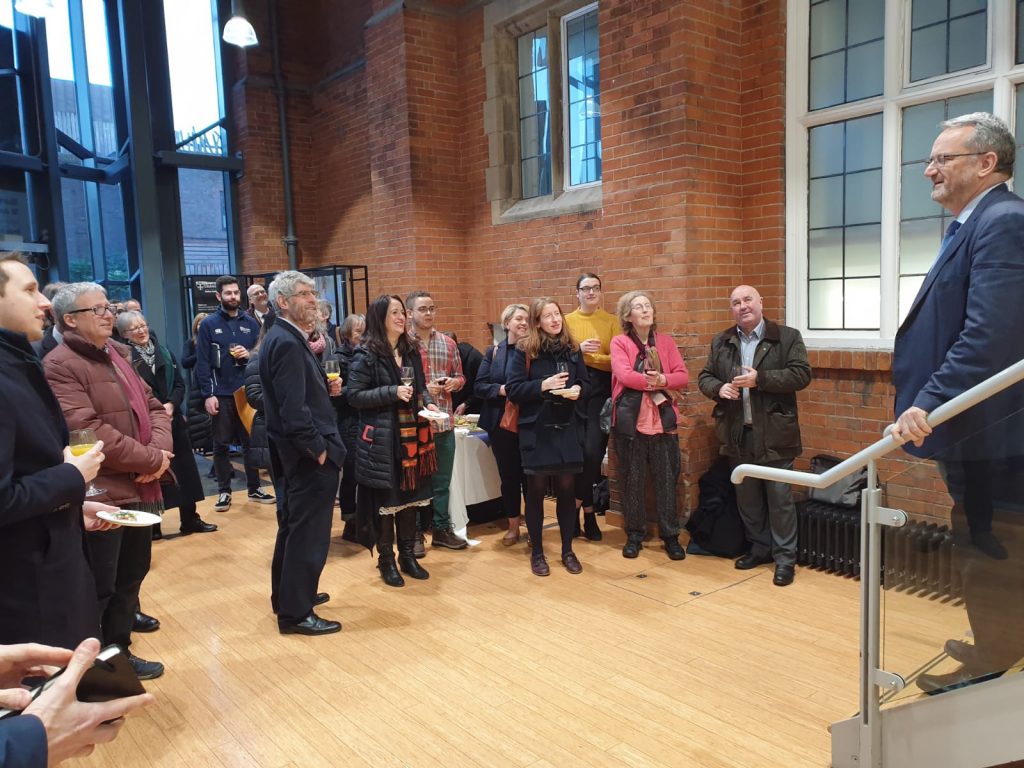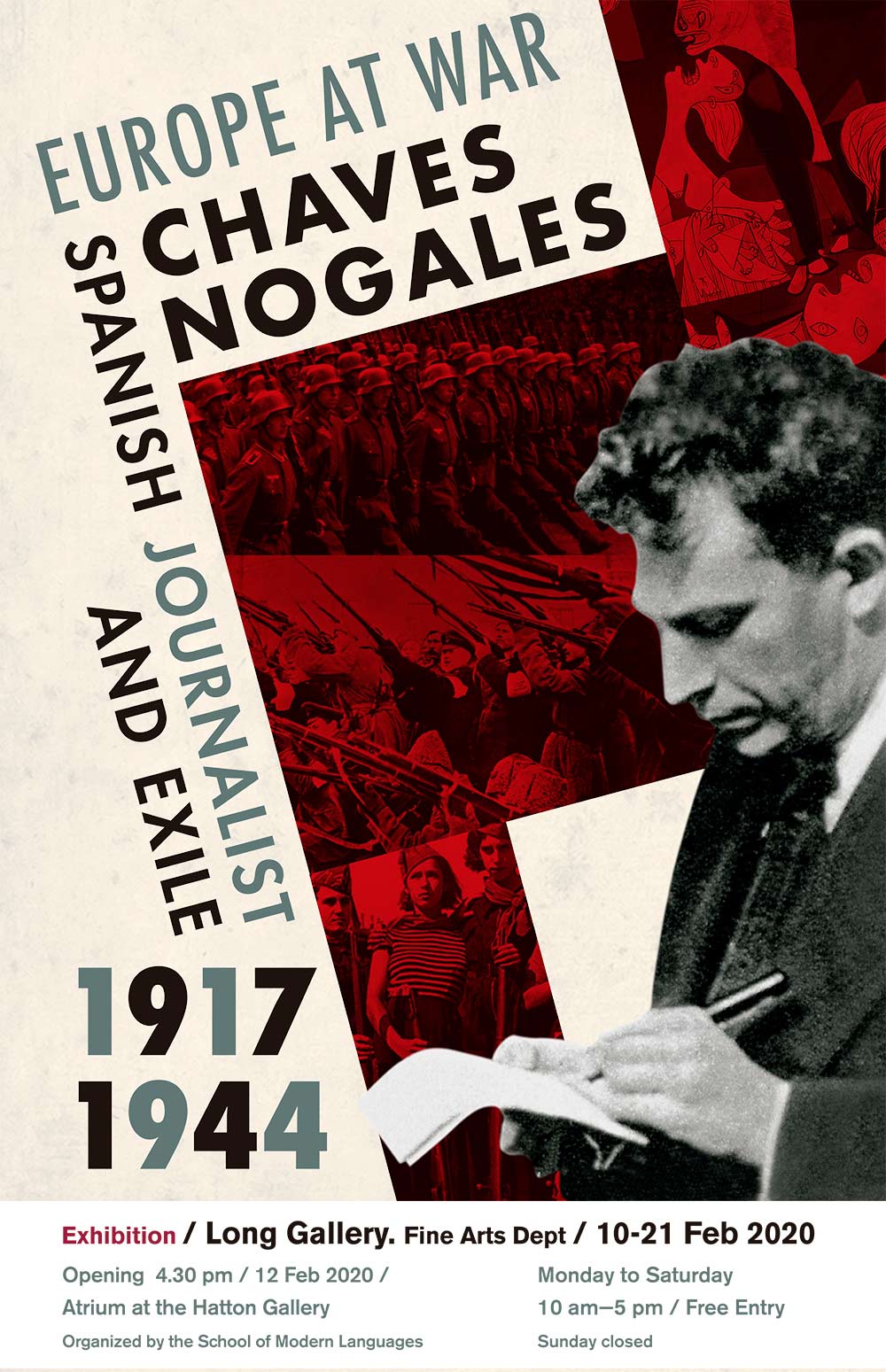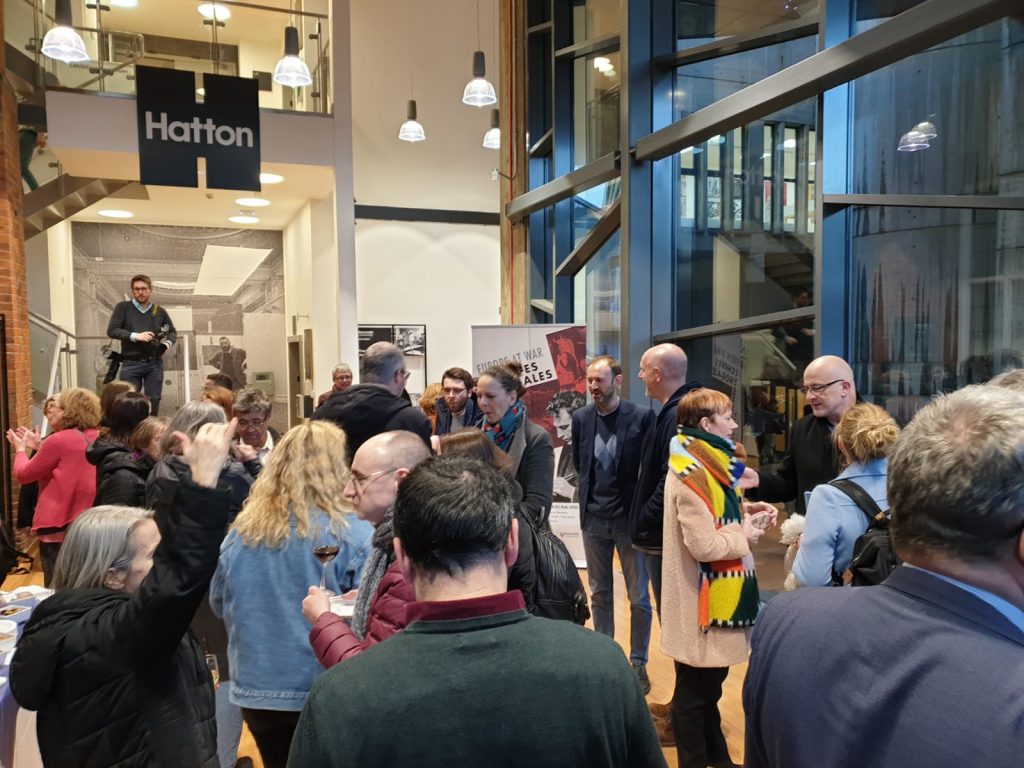An exhibition honouring Chaves Nogales opens in Newcastle

The exhibition ‘Europe at War: Chaves Nogales – Spanish journalist and exile 1917 – 1944’ is on display at Newcastle University’s Long Gallery, until the February 21st . It has been organised by staff at Newcastle University with colleagues from the University of Seville, and with the support of Instituto Cervantes Londres.
The exhibition was officially opened by one of Chaves Nogales’s grandchildren, Antony Jones, and Juan Belmonte’s great-granddaughter, Tatiana Beca Osborne. It was also attended by Director of Instituto Cervantes in London, Ignacio Peyró, and representatives from the University of Seville, such as Director of Culture and Heritage at the University of Seville, Luis Rafael Méndez Rodríguez.
The exhibition includes an original copy of one of Chaves Nogales’ articles for the North Mail and other examples of his writing. As well as paying homage to Chaves Nogales and the memory of other exiles in Britain, it also remembers the significant number of men and women from the North East who travelled to Spain in the 1930s to fight against General Franco’s forces.

Chaves Nogales, a renowned Spanish journalist
Manuel Chaves Nogales was a Spanish journalist renowned for refusing to take an extreme ideological position and who warned against the growth of fascism across Europe. He travelled extensively through Europe and was one of the first foreign correspondents to witness and report on events taking place in Russia in the immediate aftermath of the 1917 revolution, pioneering a new style of journalism that was more similar to feature-based, in-depth journalism.
In 1930, Chaves Nogales became editor of the influential and ideologically moderate newspaper, Ahora. Although he nominally supported the Republic against the military uprising of General Franco in 1936, his overriding commitment was to report the truth of what was unfolding across Europe and became part of the so-called ‘Third Spain’ affiliated to neither far right nor far left. As a result, he was regarded as one of the most incisive and unbiased journalists working in Europe.
Last November, Instituto Cervantes in London paid tribute to the memory of all Spanish exiles at the grave of Chaves Nogales. The tribute took place in the North Sheen Cemetery in London and was chaired by the ambassador of Spain to the United Kingdom, Carlos Bastarreche.

Inaugurada una exposición en honor a Chaves Nogales en Newcastle

La exposición ‘Europa en guerra: Chaves Nogales – periodista español y exilio 1917 – 1944″ se exhibe’ fue inaugurada en la galería Long de la Universidad de Newcastle y estará abierta al público hasta el próximo 21 de febrero. Ha sido organizada por el personal de la Universidad de Newcastle, junto con el de la Universidad de Sevilla y con el apoyo del Instituto Cervantes de Londres.
Inaugurada por uno de los nietos de Chaves Nogales, Antony Jones, y la bisnieta de Juan Belmonte, Tatiana Beca Osborne, a ella también asistieron el director del Instituto Cervantes de Londres, Ignacio Peyró, y representantes de la Universidad de Sevilla, como el Director de Cultura y Patrimonio de la Universidad de Sevilla, Luis Rafael Méndez Rodríguez.
La exposición incluye una copia original de uno de los artículos de Chaves Nogales para North Mail y otros ejemplos de sus escritos. Además de rendir homenaje a Chaves Nogales y el recuerdo de otros exiliados en Reino Unido, también recuerda a la cantidad de hombres y mujeres del noreste que viajaron a España en la década de 1930 para luchar contra Franco.

Chaves Nogales, un reconocido periodista español.
Manuel Chaves Nogales fue un periodista español reconocido por negarse a tomar una posición ideológica extrema y que advirtió contra el crecimiento del fascismo en toda Europa. Viajó extensamente por Europa y fue uno de los primeros corresponsales extranjeros en presenciar e informar sobre los eventos que tuvieron lugar en Rusia inmediatamente después de la revolución de 1917, siendo pionero en un nuevo estilo de periodismo que era más similar al periodismo en profundidad.
En 1930, Chaves Nogales se convirtió en director del influyente e ideológicamente moderado periódico Ahora. Aunque apoyó a la República contra el levantamiento militar de Franco en 1936, su principal compromiso fue informar de lo que se estaba ocurriendo en Europa y se convirtió en parte de la llamada ‘Tercera España’, sin afiliarse a la extrema derecha ni la extrema izquierda . Como resultado, fue considerado como uno de los periodistas más incisivos e imparciales que trabajaron en Europa.

El pasado mes de noviembre, el Instituto Cervantes de Londres rindió homenaje a la memoria de todos los exiliados españoles en la tumba de Chaves Nogales. Tuvo lugar en el Cementerio North Sheen de Londres y fue presidido por el embajador de España en el Reino Unido, Carlos Bastarreche.


